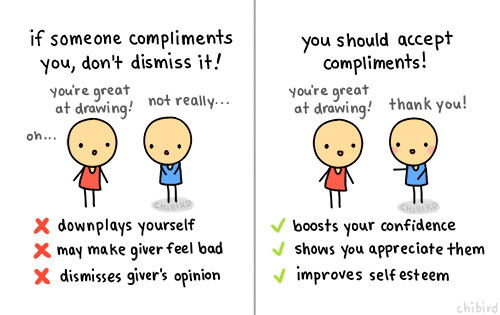We often work hard to get noticed. Dress up well to get attention. But many times we are uncomfortable when finally the hard work pays off and attention is showered on us. We deny, deflect and feel uncomfortable with the attention and praise. It is surprising yet true, that compliment more than insults unnerve us and take us by surprise.
Lets look at what are the appropriate ways to take a compliment
Accept and say ‘thank you’
Often ‘Thankyou’ with a smile is the most sincere way to accept a compliment. You may elaborate on the thanks but never negate the acceptance.
Compliment: “That’s an excellent presentation. You really owned the crowd.”
Bad response: “Thanks. But i forgot a few points in between. I think I could have done a lot better.”
Good response: “Thank you.”
Better response: “Thank you. I am glad you liked it”
“Thank you. I really worked hard on it and am very happy to know I got through to the audience”
It’s not about you: Part of the whole syndrome
I had often been part of huge organising committees. Usually on the last day of the event, somebody gets hold of me and says a very sincere, heart felt and sometimes even a teary eyed thank you. It often leaves me speechless, not because the event did not deserve the compliment but I was such a small part of the huge event, I feel undeserved it on accept on behalf of everyone that really made the event happen.
But I realised, to them I am someone that represents the event team and hence the event itself. The compliment giver gets great satisfaction when I accept it with humility on behalf of the team, rather than trivialising my role in their experience and deflecting the compliment. It, after all, is not about me.
Giving credit where it is due
Leaders often face the heat of team failures as well are heaped with praises for a work delivered by the team. A true leader never misses the opportunity to share the compliment with his/her team.
My best managers always ensured we heard back from the clients directly or through them when the client was appreciative of the team’s work. Needless to say the best managers never had much trouble retaining talent. The team members often went over and beyond the call of duty to assist such managers. I had the fortune of working with several of them.
Backhand compliment
A backhand compliment is a compliment that also carries with it an insult or a snide remark. We hear this from friends and family and often leaves one fuming.

Eg: You look really nice in this dress. Why don’t you dress up like this more often.
Bad Response: ‘You are hardly the person to comment on anyone’s dress sense.’
Good Response: ‘Thank you for the compliment on my dress.’
In the bad response, the receiver ignores the compliment and focuses only on the snide remark. In the good response, the receiver ignores the snide remark and focuses solely on the compliment.
Ignore and respond tactically. It is better if you ignore the snide remark mentally as well and not just for the response.
Inappropriate Praise:
Women face a lot of inappropriate praise at work.
“Hey beautiful/ sexy” may be appropriate in a date but never in a work context. In this case, it is best not to ignore. Ignoring may be misunderstood as docile acceptance or even a welcome. It is better to appropriately address it upfront and as early as possible.
Good response: “As my manager/colleague, I’d be more interested in hearing your inputs on my work rather on my dressing. Let’s stick to it”
Even though you may come sometimes across as rude, people will respect you for establishing boundaries upfront.
Conclusion
Accepting a compliment with grace makes both the receiver and the giver feel good. It’s not that hard. Give it a try. Why don’t you start practising it with leaving a little comment below 🙂

It’s usually hard to accept compliments without downplaying them. I’ll be aware from now on.